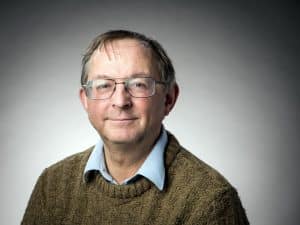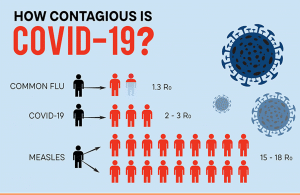Do the Maths! Professor explains the key role of modelling in the fight against Covid-19

One of the UK’s leading mathematicians explained to QE’s Year 11 how Mathematics is at the forefront of the battle against the coronavirus.
 In a special lecture delivered via Zoom, Chris Budd, Professor of Applied Mathematics at Bath, first explained to the whole year group what mathematical modelling is, with contributions also coming from a number of his PhD students. In a highly illustrated presentation, he then set out modelling’s crucial role in determining the best strategy for fighting the pandemic, even drilling down into issues such as how shopping can be made safer in a pandemic.
In a special lecture delivered via Zoom, Chris Budd, Professor of Applied Mathematics at Bath, first explained to the whole year group what mathematical modelling is, with contributions also coming from a number of his PhD students. In a highly illustrated presentation, he then set out modelling’s crucial role in determining the best strategy for fighting the pandemic, even drilling down into issues such as how shopping can be made safer in a pandemic.
Assistant Head of Mathematics Wendy Fung said: “This was a detailed look at how Mathematics has been, and continues to be, at the heart of tackling the biggest national and international issue of our day. I know that the boys found the presentation engaging and enjoyed the opportunity to considerably deepen their understanding.”
The focus on mathematical modelling struck a chord with many of the Year 11 audience, including Theo Mama-Kahn, who enjoyed discovering “an area I haven’t learnt about before. I liked how he showed us the real applications of the theory he was talking about.”
In addition to his position at the University of Bath, Chris Budd is Professor of Mathematics at the Royal Institution of Great Britain and Director of Knowledge Exchange for The Bath Institute for Mathematical Innovation – a role which involves him in finding innovative ways of applying Mathematics to real-world problems.
He was one of the authors of the Vorderman 2011 report on the current state and future of Mathematics education in the UK.
And, said Miss Fung, “Professor Budd was also the chair of the UK Mathematics Trust from 2016–2019 and, as such, has signed all of the many, many Maths Challenge certificates received by QE pupils every year.”
Professor Budd was awarded an OBE in the Queen’s Birthday Honours List in 2015 for “services to science and maths education”. In lieu of charging a fee to deliver the talk for the QE boys, he requested that a donation be made to Maths World UK – a charity aiming to establish the UK’s first national Mathematics discovery centre.
 The professor started his talk by revealing that, although not an Elizabethan, he had been born in Friern Barnet and had moved to Harrow Weald at primary school age, before going up to Cambridge to read Mathematics.
The professor started his talk by revealing that, although not an Elizabethan, he had been born in Friern Barnet and had moved to Harrow Weald at primary school age, before going up to Cambridge to read Mathematics.
He moved to the University of Bath in 1995 and has remained there ever since.
In introducing the idea of modelling, he explained how a mathematical model should balance being simple enough to analyse with being complex enough to be realistic: he quoted Einstein, who said: “A model should be as simple as possible, and no simpler”.
Next, Professor Budd showed how a model could be used to determine whether it is possible to save a dog from a speeding car.
For this, he took boys through the modelling cycle, asking:
- What are the variables?
- Which formulae can you make/use?
- Can you make a prediction using this information
- How can you make the model more realistic?
One of the boys watching, Aran Ismail, said later: “I enjoyed the relation of the lecture to motor vehicles and the ability of maths to be used to help calculate braking distances.”
 Professor Budd went on to explain how modelling has been used in the case of the Covid pandemic. There are three basic questions, he said. Firstly, how will the epidemic grow if the authorities do nothing (which was the case for the 1918 Spanish ‘flu epidemic)? Secondly, how can we stop the number of cases growing? And third, how should we change our behaviour to keep safe?
Professor Budd went on to explain how modelling has been used in the case of the Covid pandemic. There are three basic questions, he said. Firstly, how will the epidemic grow if the authorities do nothing (which was the case for the 1918 Spanish ‘flu epidemic)? Secondly, how can we stop the number of cases growing? And third, how should we change our behaviour to keep safe?
He explained that the ‘r number’ often mentioned in the media is found by considering the rate of transmission and the size of the population who are susceptible.
In order to reduce the r number, there are three strategies – achieving herd immunity, instigating lockdown and using a vaccine.
Herd immunity relies on the r number eventually decreasing; lockdowns spread out the rate at which people get infected, which helps the NHS to cope with cases, and a vaccine will reduce the number of people who are susceptible, but will need 60% of the population to be vaccinated in order to be effective.
 Modifying behaviour patterns is simply the most effective way to prevent the spread of Covid, which is why wearing masks, staying in closed bubbles and keeping 2m away from other people are the strategies the Government has been promoting most, he said.
Modifying behaviour patterns is simply the most effective way to prevent the spread of Covid, which is why wearing masks, staying in closed bubbles and keeping 2m away from other people are the strategies the Government has been promoting most, he said.
The lecture also demonstrated mathematically why it is usually safer in terms of virus transmission risk for supermarkets to allow ‘random’ shopping, rather than implementing guided movement, such as a one-way system – a conclusion which certainly caught the attention of pupil Abir Mohammed. “It was very insightful to learn about the various ways mathematical models can help simplify difficult situations and come up with solutions – I would have definitely thought having a one-way system is best,” he said.
The PhD students taking part related a little of their own experiences as young mathematicians and explained how they use modelling in everything from climate modelling to investigating the solar system to modelling traffic flow.
Pupil Sid Dutta said: “I was very interested in finding out about the lives of the students who were studying Mathematics PhDs and their daily routine.”
- More information about Professor Budd’s work, publications and interests may be found on his web page.
